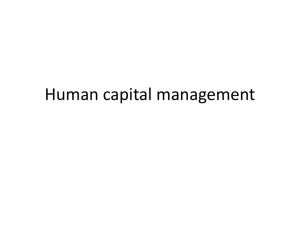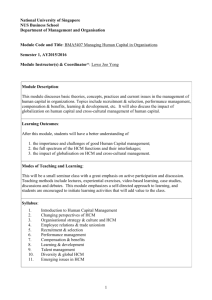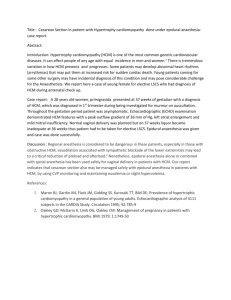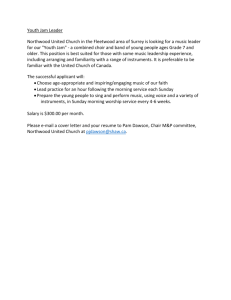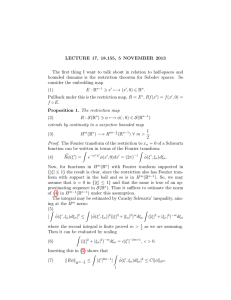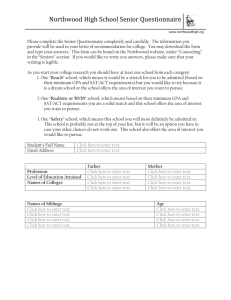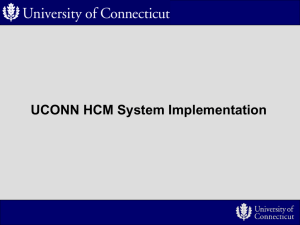Health Care Management Course Descriptions HCM 1010
advertisement
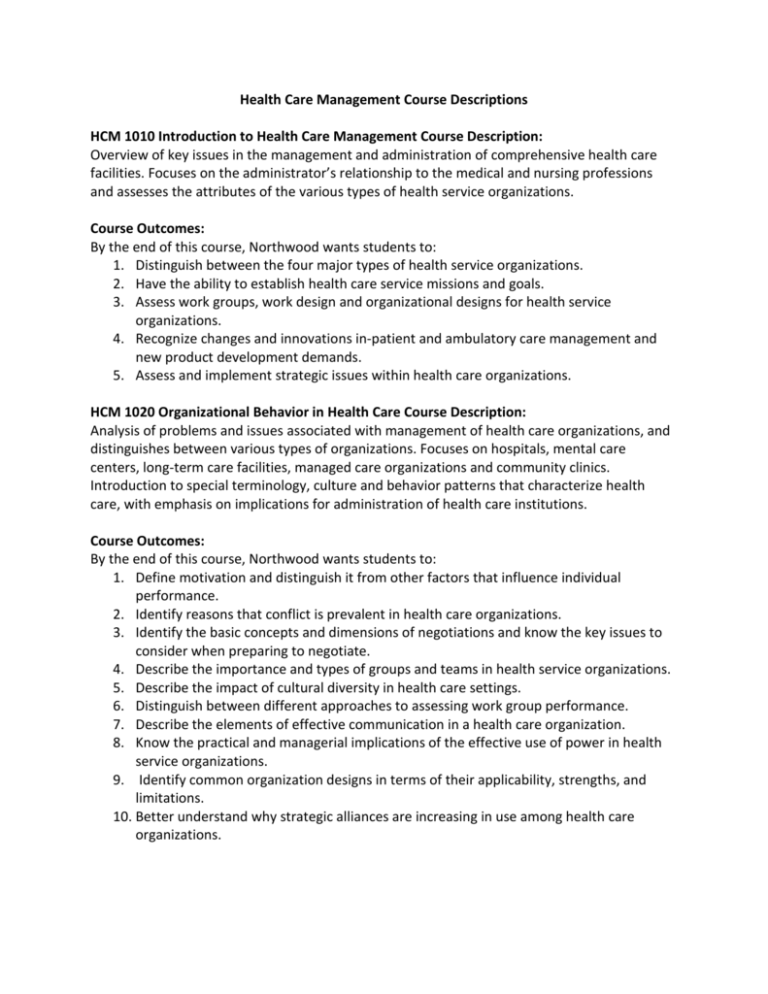
Health Care Management Course Descriptions HCM 1010 Introduction to Health Care Management Course Description: Overview of key issues in the management and administration of comprehensive health care facilities. Focuses on the administrator’s relationship to the medical and nursing professions and assesses the attributes of the various types of health service organizations. Course Outcomes: By the end of this course, Northwood wants students to: 1. Distinguish between the four major types of health service organizations. 2. Have the ability to establish health care service missions and goals. 3. Assess work groups, work design and organizational designs for health service organizations. 4. Recognize changes and innovations in-patient and ambulatory care management and new product development demands. 5. Assess and implement strategic issues within health care organizations. HCM 1020 Organizational Behavior in Health Care Course Description: Analysis of problems and issues associated with management of health care organizations, and distinguishes between various types of organizations. Focuses on hospitals, mental care centers, long-term care facilities, managed care organizations and community clinics. Introduction to special terminology, culture and behavior patterns that characterize health care, with emphasis on implications for administration of health care institutions. Course Outcomes: By the end of this course, Northwood wants students to: 1. Define motivation and distinguish it from other factors that influence individual performance. 2. Identify reasons that conflict is prevalent in health care organizations. 3. Identify the basic concepts and dimensions of negotiations and know the key issues to consider when preparing to negotiate. 4. Describe the importance and types of groups and teams in health service organizations. 5. Describe the impact of cultural diversity in health care settings. 6. Distinguish between different approaches to assessing work group performance. 7. Describe the elements of effective communication in a health care organization. 8. Know the practical and managerial implications of the effective use of power in health service organizations. 9. Identify common organization designs in terms of their applicability, strengths, and limitations. 10. Better understand why strategic alliances are increasing in use among health care organizations. HCM 2010 Economics of Health Care Course Description: Analysis of economic factors bearing on the costs and affordability of health care. Public perceptions, attitudes, and political pressures as they affect demand for health services; reimbursement policies shaping service delivery; competition and alternative delivery systems; managed care and other government and private payer attempts to control costs, and overview of the medical cost containment crisis. Course Outcomes: By the end of this course, Northwood wants students to: 1. Describe the economic consequences of a wide range of public policies that impact the health care industry. 2. Discuss the economic impact of many government-supplies services in the health care industry. 3. Integrate the development and current activities of various regulatory bodies as they relate to the health care industry. 4. Be able to converse intelligently on current economic issues that impact the health care industries. 5. Know how to utilize the limited resources, restriction of growth, and reorganization of the methods of financing and delivering health care. 6. Be aware of the influence of both internal and external economic market forces in the shaping of health care. 7. Comprehend and implement changes brought about by the economic challenges of reimbursement policies introduced by governmental and health insurance programs. 8. Be aware of facility and physician availability in the United States and the implication of specialists in the health care service industry. HCM 3000 Health Care Accounting, Budgeting and Financial Management Course Description: Application of accounting, budgeting and financial management concepts and techniques to managerial decision making in the health care industry. Examines how private and public agencies determine program priorities, allocate resources to execute programs and obtain funds through taxation, bond issues, and other means. Explores cash flow problems related to third-party payments. Uses case study analysis to determine financial techniques and reporting for health care providers. Prerequisite: FIN 3010 Course Outcomes: By the end of this course, Northwood wants students to: 1. Calculate and analyze financial statement ratio analysis specific to the health care industry. 2. Explain the importance of controlling costs including cost terminology specific to health care industry. 3. Summarize the importance of budgeting to a health care provider, including the proper utilization of different types of budgets used in the health care industry. 4. Compare profit, not-for-profit and non-profit aspects of health care providers. 5. Explain the four C's of the health care financial manager - costs, cash, capital and conservation. 6. Explain the role of profit centers and cost centers in the health care industry. 7. Identify inventory management concepts used in the health care industry. HCM 3030 Human Resource Management in the Health Care Industry Course Description: Analyzes special problems of forecasting, planning, staffing, and developing human resource management in health care institutions. Explores legal aspects of human resource management and administration in the industry, with emphasis on compliance. Course Outcomes: By the end of this course, Northwood wants students to: 1. Manage the relationships of the employee within the organization. 2. Work within the framework of the regulatory issues with which human resource management must deal, including ADA, FEB, Family Leave, etc. 3. Be able to assess the effective leadership and motivational approaches in the organization. 4. Be aware of equal opportunity employment compliance and affirmative action. 5. Understand the methods of job analysis and job descriptions in the area of human resource management as they relate to the health care industry. 6. Be able to use of training and development programs and how they are applied in health care institutions. 7. Be able to develop incentive and merit pay programs. 8. Know how to implement legal and behavioral approaches to grievance procedures, and assist in the development of new and innovative procedures for health care providers. HCM 3040 Legal and Ethical Issues in Health Care Course Description: Basic principles of law applicable to the business world, emphasizing contract, sales, bailment’s, negotiable instruments, agency, partnerships, corporations, insurance, and real estate. Course Outcomes: By the end of this course, Northwood wants students to: 1. Know how to utilize the services of legal counsel. 2. Know how to utilize the provisions of the Uniform Commercial code including the nature and classes of contracts, their assignment and termination. 3. Have a working knowledge of the legal application of the corporate entity and/or professional associations. 4. Understand the legal implications of providing health care services to the general public and the legal responsibilities of undertaking these services. 5. Recognize the central role of public health ethical concerns in health policy and management. 6. Have an understanding of the humanistic as well as technically adept participants in the health service field. 7. Acquire a framework for legal and ethical analysis of issues within health service systems. 8. Recognize how to manage ethics issues with regard to the development and distribution of a payment for services within health service systems. 9. Determine what tensions exists between protection of the public health and protection of individual rights. 10. Understand and integrate the obligations of health care insurers and health care providers in meeting the "right to know" of patients. 11. Understand government's participation in the health service field. HCM 4010 Health Care Quality Management Course Description: Comprehensive examination of those systems that measure and maintain quality in health care. Continuous improvements of the Total Quality Management discipline as it applies to health care. Course Outcomes: By the end of this course, Northwood University wants students to: 1. Know how health care organizations identify, select and implement systems that are designed to assist in the measurements and maintenance of quality in health care organizations. 2. Identify and summarize the generally accepted principle of Total Quality Management as it is applied within the health care industry. 3. Identify and describe distinctive characteristics of the various health care processes as they relate to finance, accounting, operations, facilities, marketing and information systems. 4. Perform reasonably sound and complete cost benefit analysis of proposed systems (new and/or revised). HCM 4020 Current Topics in Health Care Management Course Description: The analysis, discussion and reporting from current literature of significant trends, controversial issues affecting health care, and application of advanced decision-making techniques to those issues. Course Outcomes: By the end of this course, Northwood wants students to: 1. Discern current and impending economic, political, legal, technological, and social trends, which have special significance for the health care industry. 2. Analyze current literature and summarize important concepts as they relate to current changes and trends in the industry. 3. Understand and identify current significant business trends and the factors shaping them. 4. Identify sources of practical business information, including periodicals, databases and books as they relate to the health care industry. 5. Demonstrate written and oral reporting, critical analysis, and discussion skills, in presenting and defending the methods used and findings reached. HCM 4030 Marketing Management for the Health Care Industry Course Description: Application of marketing concepts and techniques within and to health care institutions. Comprehensive overview of market analysis for new and on-going products and services Course Outcomes: By the end of this course, Northwood University wants students to: 1. Recognize the role of marketing in the health care industry. 2. Describe the concept of marketing research and information gathering in the health care industry. 3. Know what the market consists of in terms of market, money, and people. 4. Understand the influence of cultural and social groups as it relates to the health care industry. 5. Know the nature and importance of marketing of services in health care. 6. Understand the importance of international marketing and alternative orientation toward international operations in the health care industry. 7. Discuss market planning, forecasting, evaluating, and know how to manage the health care industry and planning in theory and practice. HCM 4060 Industry Trends in Health Care Management Course Description: This capstone course for Health Care Management majors focuses on the application of the principles, concepts, and theories underlying the discipline. Emphasis is on the application of high-ordered thinking and decision-making techniques regarding industry trends in Health Care Management. Prerequisites: HCM 3000, HCM 4010, HCM 4030 Course Outcomes: 1. Utilize financial statement ratio analysis to make fiscally-sound management decisions and recommendation. 2. Analyze current and future demographic and government trends and how they will influence the health care management industry. 3. Analyze and discuss current significant business trends and the factors shaping them within the health care industry 4. Utilize understanding of finance and accounting, human resources, operations, marketing and management of a health care organization to create recommendations for continous improvement and value creation
